Lesson Eleven
Dialogue eleven: Buying cloth
L: du jaamo du paara kapRá shta? Do you have cloth for clothes? | د جامو د پاره کپړه شته؟ |
H: daa Tóla kapRá du jaamo du paara da. All of the cloth is for clothes. | دا ټوله کپړه د جامو د پاره ده. |
L: daa maal paakistaanáy day, aw ku bahranáy day? Are these goods from Pakistan or from overseas? | دا مال پاکِستانے دے، او کۀ بهرنے دے؟ |
H: da bahranáy day, hágha noor paakistaanée dee. This is foreign, these others are Pakistani. | دا بهرنے دے، هغه نور پاکِستانی دی. |
L: yo khu rang me pukáar day. I need a good colour. | يو ښۀ رنګ مې پکار دے. |
H: daa Tol khu rangóona dee. aasmaanee rang sahée day? These are all good colours. Blue colour is good? | دا ټول ښۀ رنګونه دى. آسمانى رنګ صحيح دے. |
L: aw, kho daa kapRá Déra Dabála khkáaree. luga narúy nishta? Yes, but that cloth looks very thick. Don't you have anything thinner? | او، خو دا کپړه ډېره ډبله ښکارى. لږه نرۍ نشته؟ |
H: na, kho daa Tóle du oRée dupáara dee. No, but all of these are for summer. | نه، خو دا ټولې د اوړى د پاره دى. |
L: joRá ba du tso gúzo na jóRa shee? How many yards will it take to make a suit from it? | جوړه به د څو ګزو نه جوړه شى؟ |
H: staa joRá ba du oowo guzo na jóRa shee. It will take seven yards to make a suit for you. | ستا جوړه به د اوو ګزو نه جوړه شى. |
L: tso shwe? How much? | څو شوې؟ |
H: shpug sawa roopúy. Six hundred rupees. | شپږ سوه روپۍ. |
L: oowú gúza ráaka! Give me seven yards! | اووۀ ګزۀ راکه! |
Pronunciation Drill
- Contrasting ل - l and ړ - R
| daa lóonD day. | This is wet. | دا لوند دے. |
| daa Roond day. | This is a blind person. | دا ړُوند دے. |
| lambdawúl khu kaar nu day. | It is not good to make wet. | لمدول ښۀ کار نۀ دے. |
| Randawúl khu kaar nu day. | It is not to make someone blind. | ړندول ښۀ کار نۀ دے. |
| day daa talée. | He is weighing it. | دے دا تلى. |
| day daa taRée. | He is tying it. | دے دا تړى. |
- Contrasting ے - ay and ۍ - uy
| dágha spay naráy day. | That dog is skinny. | دغه سپے نرے دے. |
| dágha spuy narúy da. | That female dog is skinny. | دغه سپۍ نرۍ ده. |
| haghá zmaa nwasáy day. | That is my grandson. | هغه زما نوسے دے. |
| haghá zmaa nwasúy da. | That is my granddaughter. | هغه زما نوسۍ ده. |
| haghá pakhwaanáy jirmanáy day. | He is an old German. | هغه پخوانے جرمنے دے. |
| haghá pakhwaanúy jirmanúy da. | She is an old German. | هغه پخوانۍ جرمنۍ ده. |
The directive pronouns: را - raa, در - dăr, and ور - wăr
The prefix را - raa indicates movement towards me/us, the speaker. ور - wăr indicates movement towards a third person or place, and در - dăr indicates movement towards you (second person).
- را - raa:
| day maa ta kitáab raa-kawée | He is giving the book to me. | دے ما ته کتاب راکوى. |
- ور - wăr:
| day wăr-ta kitaab wărkawée | He is giving the book to him. | دے ورته کتاب ورکوى. |
Note that ور - wăr is used in place of هغهٔ - haghú
- در - dăr:
| haghá taa ta kitáab dăr-kawée | He is giving the book to you. | هغه تا ته کتاب درکوى. |
Examples:
| haghá raazee. | He is coming (here). | هغه راځى. |
| haghá dărzee. | He is going (towards you). | هغه درځى. |
| haghá wărzee. | He is going (there). | هغه ورځى. |
| wărsha! | Go (to him, her, them)! | ورشه! |
| ráash! | Come (to me)! | راشه! |
NOTE:
These pronouns may also be used instead of object pronouns in the oblique case. For example:
| raa-sara ze? | Are you going with me? | راسره ځې؟ |
| aw, dăr-sara zum. | Yes, I'm going with you. | او، درسره ځم. |
| moong wăr-sara zoo. | We are going with them. | مُونږ ورسره ځُو. |
| tu raa-ta tsu raa-kawé? | What are you giving to me? | تۀ راته څۀ راکوې؟ |
| zu dăr-ta chaay dăr-kawúm. | I'm giving tea to you. | زۀ درته چائ درکوم. |
| zu wăr-ta kitáab wăr-kawum. | I'm giving a book to them. | زۀ ورته کتاب ورکوم. |
More examples:
| tu maa-ta payse raa-kawe? | Are you giving me money? | تۀ ما ته پیسې راکوې؟ |
| na, zu taa-ta DoDúy dăr-kawúm. | No, I'm giving you bread. | نه، زۀ تا ته ډوډۍ درکوم. |
| day karéem ta kaaghúz wăr-kawee? | Is he giving paper to Karim? | دے کريم ته کاغذ ورکوى؟ |
| na, wăr-ta yo kitáab wăr-kawée. | No, he is giving him a book. | نه، ورته يو کتاب ورکوى. |
| taaso naajóRo ta tsu wăr-kawéy? | What are you giving to the sick? | تاسو ناجوړو ته څۀ ورکوئ؟ |
| moong wăr-ta daaróo wăr-kawoo. | We are giving them medicine. | مُونږ ورته دارُو ورکوؤ. |
| zmaa zooy ta maNá wăr-kawé? | Are you giving an apple to my son? | زما زوئ ته مڼه ورکوې؟ |
| na, maNá wăr-ta nu wăr-kawúm. | No, I'm not giving him an apple. | نه، مڼه ورته نۀ ورکوم. |
| day ba tsu wakht raa-ta paysé raa-kawee? | When will he give me the money? | دے به څۀ وخت راته پیسې راکوى؟ |
| payse ba dărta nu dăr-kawee. | He won't give you the money. | پیسې به درته نۀ درکوى. |
Directive pronouns with که - ka (give!)
Use the pictures below to practice these sentences, and in addition, add your own. Imagine that one person in the picture is زهٔ - zu.
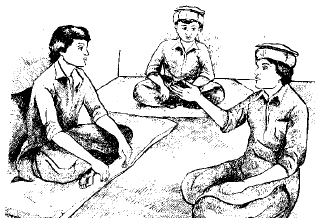
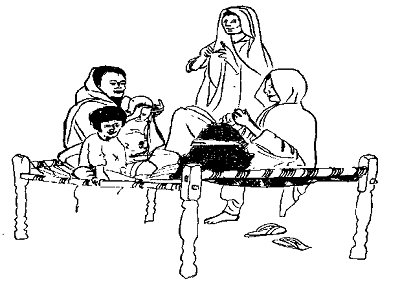
| haghé la qalúm wăr-ka! | Give her the pen! | هغې له قلم ورکه! |
| daa haghé la wăr-ka! | Give it to her! | دا هغې له ورکه! |
| haghu la qalum wăr-ka! | Give him the pen! | هغۀ له قلم ورکه! |
| daa maa la raa-ka! | Give it to me! | دا ماله راکه! |
| daa haghwée la wăr-ka! | Give it to them! | دا هغوى له ورکه! |
| maa la dwa keelo raa-ka! | Give me two kilos! | ماله دوه کيلو راکه! |
👆 Now practice the same drill with different objects around the room
More practice with directive pronouns
| taa la payse nu dăr-kawum, du la payse wăr-kawum. | I'm not giving money to you, I'm giving it to him. | تا له پیسې نۀ درکوم، دۀ له ېیسې ورکوم. |
| kitáab dăr-sara shta? | Do you have a book with you? | کتاب درسره شته؟ |
| zu khpul dost la wăr-kawum aw taa la nu dăr-kawum. | I'm giving it to my friend and not to you. | زۀ خپل دوست له ورکوم او تاله نۀ درکوم. |
| ku zmaa dost raashee zu ba yuwa pookaNúy wăr-la wăr-kawum. | If my friend comes, I will give him a balloon. | کۀ زما دوست راشى زۀ به يوه پوکڼۍ ورله ورکوم. |
| moong wăr-la dawaa`ee wăr-kawóo. | We are giving him medicine. | مُونږ ورله دوائى ورکوو. |
| tu zmaa zooy la maNá wăr-kawe? | Are you (sing.) giving my son an apple? | تۀ زما زوئ له مڼه ورکوې؟ |
| taaso zmaa zooy la maNá wăr-kawey? | Are you (plur.) giving my son an apple? | تاسو زما زوئ له مڼه ورکوئ؟ |
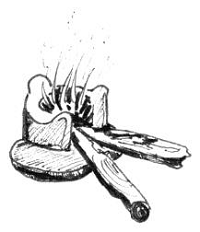
Creating compound verbs from adjectives
| or bal day. | The fire is ablaze. | اور بل دے. |
| haghá or balawee. | He is lighting the fire. | هغه اور بلوى. |
| hágha war wăle band day? | Why is that door shut? | هغه ور ولې بند دے؟ |
| haghá war wăle bandawe? | Why are you closing that door? | هغه ور ولې بندوې؟ |
| staa moTúr joR sho? | Is your car fixed? | ستا موټر جوړ شو؟ |
| staa moTúr joRawum. | I'm fixing your car. | ستا موټر جوړوم. |
| largée maat dee. | The wood is broken. | لرګى مات دى. |
| hagha oos largée maatawee. | He is breaking the wood now. | هغه اوس لرګى ماتوى. |
| du haghé koTá paaka da. | Her room is clean. | د هغې کوټه پاکه ده. |
| haghá koTá paakawee. | She is cleaning the room. | هغه کوټه پاکوى. |
| ghwakha pakhá da. | The meat is cooked. | غوښه پخه ده. |
| khaansaamá ghwakha pakhawee. | The cook is cooking the meat. | خانسامه غوښه پخوى. |
| kiRkúy kooláaw dee. | The windows are open. | کړکۍ کولاؤ دى. |
| zu kiRkúy koolaawum. | I'm opening the windows. | زۀ کړکۍ کولاوم. |
| oos chaay pakhegee. | Tea is cooking now. | اوس چائې پخېږى. |
NOTES:
- Most adjectives can be combined with کول - kawúl (to make) to form compound transitive verbs. (sometimes called stative compounds) For example the feminine singular form of the adjective پوخ - pokh (cooked) is پخه - pakhá and is combined to form the verb پخول - pakhawúl (to cook):
| táaso saag pu oobú ke pakhawéy? | Do you cook spinach in water? | تاسو ساګ په اوبو کښې پخوئ؟ |
| na, pu ghwaRó ke ye pakhawóo. | No, we cook it in oil. | نه، په غوړو کښې یې پخوُو. |
- For adjectives that end in a consonant, the initial ک - k in کول - kawul is dropped in the present tense (as well as for the continuous past, introduced later):
| Adjective | Compound Transitive Verb |
|---|---|
bal ablaze, kindled بل | balawul to light, to turn on بلول |
band closed بند | bandawul to close, to shut بندول |
paak clean, tidy پاک | paakawul to clean پاکول |
pokh ripe, cooked پوخ | pakhawul to cook پخول |
joR healthy, sound جوړ | joRawúl to build, to fix جوړول |
safáa clean, tidy صفا | safáa kawúl to clean صفا کول |
kooláaw open کولاؤ | koolaawúl to open کولاول |
maat broken مات | maatawúl to break ماتول |
- There is another type of compound verbs (sometimes called “dynamic compound verbs") which involve "doing” actions using کول - kawul (to do) to "do" a noun. The noun in these compounds is the object of the sentence, and the verb کول - kawul (to do) behaves differently than کول - kawul (to make). With these kinds of compounds the initial ک - k in کول - kawul is never dropped.
{" "}
| Noun | Dynamic Compound |
|---|---|
kaar work کار | kaar kawul to work کار کول |
khob sleep خوب | khob kawul to sleep خوب کول |
istrée ironing اِستری | istrée kawúl to iron اِستری کول |
jaaróo broom جارُو | jaaróo kawul to sweep جارُو کول |
khabure speech خبرې | khabure kawul to talk خبرې کول |
lóbe games لوبې | lobe kawul to play لوبې کول |
waadú marriage وادهٔ | waadú kawul to marry وادهٔ کول |
- Names of professions can also be combined with the auxillary verb کول - kawul (to do) to make “doing” compounds like the chart above.
| Professional | Profession | Compound |
|---|---|---|
tarkáaN carpenter ترکاڼ | tarkáaNee carpentry ترکاڼی | tarkaaNée kawúl to do carpentry ترکاڼی کول |
ghul thief غل | ghlaa theft غلا | ghlaa kawul to steal غلا کول |
- The verb حوړول - joRawúl (to fix, make, repair) is also used in numerous ways:
| tarkáaN staa du paara tsu joRawée? | What is the carpenter making for you? | ترکاڼ ستا د پاره څۀ جوړوى؟ |
| tsu wakht khpul wekhtú joRawé? | When are you getting your hair cut? | څۀ وخت خپل وېښتۀ جوړوې؟ |
| haghwee chaa du paara hágha nuway kor joRawee? | Who are they building that new house for? | هغوى چا د پاره هغه نوے کور جوړوى؟ |
The verb وهل - wahúl (to hit, beat)
| da halukáan hăr wakht spee wahee. | These boys are hitting dogs all the time. | دا هلکان هر وخت سپى وهى. |
| wăle hărawruz maa wahe? | Why do you hit me every day? | ولې هره ورځ ما وهې؟ |
| daa hăra shpa pu khob ke chughe wahee. | She cries-out [i.e. shouts] in her sleep every night. | دا هره شپه په خوب کښې چغې وهى. |
| day pu hágha seend ke laambo wahee. | He is swimming in that river. | دے په هغه سيند کښې لامبو وهى. |
| fankáar hăra shpa pu de hoTúl ke rabáab wahee. | The musician plays rabab every night at this hotel. | فنکار هره شپه په دې هوټل کښې رباب وهى. |
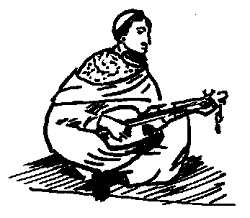
NOTE:
The رباب - rabáab is a stringed instrument, popular with Pukhtuns.
The verb نیول - neewúl (to catch, take, hold)
| day yo nuway kor pu karaaya neewúlay day. | He has rented a new house. | دے يو نوے کور په کرايه نيولے دے. |
| mUsalmaanáan hăr kaal yúwa myaasht rojze neesee. | Muslims take the fast for one month every year. | مسلمانان هر کال يوه مياشت روژې نيسى. |
| haghwee pu hágha seend ke looy maayáan neesee. | They are catching big fish in that river. | هغوى په هغه سيند کښې لوئ مهيان نيسى. |
| marghúy neewul khu khabura nu da. | Catching birds is not a good thing. | مرغۍ نيول ښۀ خبره نۀ ده. |
| zmaa kitaab ooneesa, zu raazum. | Hold my book, I'm coming. | زما کتاب ونيسه زۀ راځم. |
How to say “I don’t know”
| maa ta páta nishta. | I don't know (anything). | ما ته پته نشته. |
| páta nú-lugee | I don't know. | پته نهٔ لګی. |
The emphatic adjective خپل - khpul (own)
| daa du chaa kitáab taa la dăr-kawee? | Whose book is she giving to you? | دا د چا کتاب تاله درکوى؟ |
| daa khpul kitaab maa la dăr-kawee. | She is giving me her own book. | دا خپل کتاب ماله راکوى. |
| tu du chaa jaamé aghonde? | Whose clothes are you wearing? | تۀ د چا جامې اغوندې؟ |
| zu khpule jaamé aghondum. | I'm wearing my own clothes. | زۀ خپلې جامې اغوندم. |
| taaso yowa qeesa chaa ta waayey? | Who are you telling a story to? | تاسو يوه قيصه چاته وايئ؟ |
| zu ye khpule loor to waayum. | I'm reading it to my daughter. | زۀ يې خپلې لُور ته وايم. |
| taaso yuwa qeesa chaata kawey? | Who are you telling a story to? | تاسو يوه قيصه چاته کوئ؟ |
| zu ye khpule loor ta kawum. | I'm reading it to my daughter. | زۀ يې خپلې لُور ته کوم. |
| daa qamées du chaa du paara ganDé? | Whom are you sewing this shirt for? | دا قميص د چا د پاره ګنډې؟ |
| zu ye khpul zaan du paara ganDúm. | I'm sewing it for myself. | زۀ يې خپل ځان د پاره ګنډم. |
| haghá du chaa du paara parde aw tolaa`ee joRawee? | Who is she making the curtains and mattresses for? | هغه د چا دپاره پردې او تولائى جوړوى؟ |
| du khpule tror du paara ye joRawée. | She is making them for her aunt. | د خپلې ترور د پاره يې جوړوى. |
| tu oos chărta ze? | Where are you going now? | تۀ اوس چرته ځې؟ |
| zu khpul kor to zum. | I'm going to my house. | زۀ خپل کور ته ځم. |
| haghá du chaa saaykúl khartsawee? | Whose bicycle is he selling? | هغه د چا سائيکل خرڅوى؟ |
| haghá khpul saaykúl khartsawee. | He's selling his own bicycle. | هغه خپل شائیکل خرځوی. |
| daa du chaa du paara DoDúy pakhawee? | Whom is she cooking food for? | دا د چا د پاره ډوډۍ پخوى؟ |
| du khpulo maashoomaano du paara pakhawee. | She is cooking for her own children. | د خپلو ماشُومانو د پاره پخوى. |
| daa Topúy staa khpula da? | Is this hat your own? | دا ټوپۍ ستا خپله ده؟ |
| aw, daa Topúy zmaa khpula da. | Yes, this is my own hat. | او، دا ټوپۍ زما خپله ده. |
| haghwée tsok dee? | Who are they? | هغوى څوک دى؟ |
| haghwee zmaa khpul dee. | They are my own (relatives). | هغوى زما خپل دى. |
NOTES:
The same subject pronoun and possessive adjective cannot be used in the same sentence. خپل - khpul replaces the adjective.
Note the ungrammatical examples and corrections below:
| Incorrect | Correct | |
|---|---|---|
zu zmaa kitáab larúm زهٔ زما کتاب لرم. | I have my book | zu khpul kitáab larúm زه خپل کتاب لرم. |
tu staa kar ta ze? تۀ ستا کور ته ځې؟ | Are you going to your house? | tu khpul kor ta ze? تۀ خپل کور ته ځې؟ |
day du du khúze sara zee دے د دۀ ښځې سره ځى. | He is going with his wife | day khpule khuze sara zee. دے خپلې ښځې سره ځى. |
- خپل - khpul is inflected for number, gender and case. For example the phrase:
| khpulo maashoomáano du páara | for your children | خپلو ماشُومانو د پاره |
Memorising moments
mataloona
Rahman Baba
Comprehension drill: Learning location through commands
👆 Take a pen and quickly obay commands given by your helper without looking at your book!
| qalúm khpul săr du páasa ooneesa! | Hold the pen above your head! | قلم خپل سر د پاسه ونيسه! |
| khpul qalúm du kitáab láande kégda! | Put your pen under the book! | خپل قلم د کتاب لاندې کېږده! |
| khpul qalúm pu kitáab baande kégda! | Put your pen on the book! | خپل قلم په کتاب باندې کېږده! |
| khpul qalúm pu khpúla khwaa ke ooneesa! | Put your pen by your side! | خپل قلم په خپله خوا کښې ونيسه! |
| khpul qalúm du kaaghúz khwaa ta kégda! | Put your pen next to the paper! | خپل قلم د کاغذ خواته کېږده! |
Now add the directive pronouns را- - raa-, در- - dăr-, and ور- - wăr- to the commands. For example, “Put the pen next to her!”, “ … next to me!”, etc.
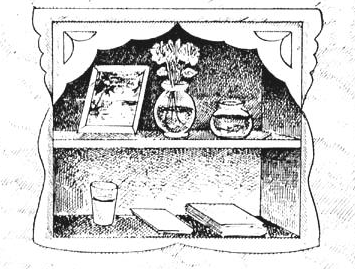
Exercises for Lesson Eleven
- Substitute the following words for the bold word in the sentence:
| jáamo du paara kapRé dee? | جامو د پاره کپړې دی؟ |
- Fill in the correct directional pronoun را- - raa-, در- - dăr-, or ور- - wăr- in the following sentences:
- Replace the inflected pronoun in the sentences below with the correct directional pronoun Fill in the correct directional pronoun را- - raa-, در- - dăr-, or ور- - wăr- and adjust accordingly.